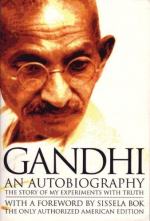|
This section contains 550 words (approx. 2 pages at 400 words per page) |

|
An Autobiography: The Story of My Experiments with Truth Summary & Study Guide Description
An Autobiography: The Story of My Experiments with Truth Summary & Study Guide includes comprehensive information and analysis to help you understand the book. This study guide contains the following sections:
This detailed literature summary also contains Topics for Discussion and a Free Quiz on An Autobiography: The Story of My Experiments with Truth by Mahatma Gandhi.
An Autobiography: The Story of My Experiments with Truth by Mohandas K. Gandhi traces Gandhi's life from his birth in Porbandar until the end of 1920, after his policy of non-cooperation with government is passed by the All-India Congress Committee. Gandhi says that at this point, his life has become so public that there is no need for him to write about it. The book is basically about how Gandhi arrives at the principles he holds and how they come about from his search for and belief in truth.
The story begins with Gandhi's childhood in the Porbandar and Rajkot. He is educated in the local schools until he finishes high school. While still in high school at the age of 13, in an arranged marriage, Gandhi marries a woman named Kasturbai, who stands by him his whole life. He is excited about the marriage at the time but both Gandhi and Kasturbai are against early marriages for their children. His father dies when he is sixteen and still in school. Gandhi finishes high school and goes on to study at Samaldas College, a local college located in Bhavnagar. He stays for just one semester and then decides to go to England where he can become a barrister in three years. Gandhi's mother is against the idea and to get her approval, Gandhi has to take a vow to not touch wine, women or meat while away. Gandhi reads for his exams, passes them, enrolls in the High Court and returns to India.
Gandhi is unsure of himself practicing law in India. He tries to intervene with an acquaintance, now the Political Agent in England, on behalf of his brother and they have sharp words. Gandhi's career is in jeopardy since appeals go to the Political Agent. Gandhi accepts an offer from a law firm in South Africa to help them with a case and after spending one year there he decides to stay there to help the Indian community. He works in South Africa until just two weeks prior to the outbreak of WWI in 1914. Back in India, he continues his public work, having already made a name for himself from his work in South Africa with Satyagraha, or civil disobedience and resistance by non-violent methods.
Gandhi's book accurately reflects the general goal and intent of his life - the search for truth and his firm belief in that truth. He believes that truth is God and all his experiments concern his attempts to achieve truth and purity. His experiments with dietetics are a life-long deal, and he seeks to find the perfect diet - one that wipes out lust and allows man to control his mind and thoughts. Within this framework he develops his principles for government reform. This consists of agitation through the use of civil disobedience and resistance without resorting to violence. One cannot practice civil disobedience without knowing and respecting the laws of the land since one must chose which laws to disobey and when. The uneducated can't do this, which is why the national day of hartal resulted in violence. The population hadn't been taught the principles of civil disobedience. Gandhi ends his book in 1920 during the period of agitation and non-cooperation. The events of his life are well-known after that point.
Read more from the Study Guide
|
This section contains 550 words (approx. 2 pages at 400 words per page) |

|



